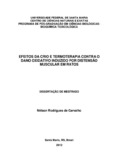| dc.creator | Carvalho, Nélson Rodrigues de | |
| dc.date.accessioned | 2012-12-13 | |
| dc.date.available | 2012-12-13 | |
| dc.date.issued | 2012-03-16 | |
| dc.identifier.citation | CARVALHO, Nélson Rodrigues de. EFFECTS OF THE CRYO AND THERMORAPY AGAINST THE OXIDATIVE DAMAGE INDUCED BY A MUSCLE STRAIN INJURY IN RATS. 2012. 48 f. Dissertação (Mestrado em Ciências Biológicas) - Universidade Federal de Santa Maria, Santa Maria, 2012. | por |
| dc.identifier.uri | http://repositorio.ufsm.br/handle/1/11192 | |
| dc.description.abstract | Skeletal muscle injuries are among the most frequent causes of functional impairment in muscle tissue, affecting the life quality and are primarily responsible for the loss of rhythm in the case of training athletes. The skeletal muscle lesion most frequent are contusion and strain injury. Thus, developing therapies that mitigate and might accelerate the rehabilitation process of injured tissue are of great importance. For this reason, therapeutic applications of physical agents are gaining prominence, especially in sports medicine for the treatment of skeletal muscle injury, but do not have the mechanism of action fully understood. This study was performed in order to examine whether the modulation of oxidative stress could be an important factor involved in the beneficial effect of cryo and thermoterapy on strain gastrocnemius muscle injury. Adult male Wistar rats were submitted to a strain injury and treated with the therapeutic agents in an isolated or combined form. Strain damages caused an increase in muscle and blood oxidative damage. We suggest that this oxidative damage is possible related to the impairment of the muscle cells structure since that we observed a significant positive correlation among the increase in plasma Creatine Kinase levels and in muscle and blood Dichlorofluorescein oxidized and Thiobarbituric acid reactive substance levels. The inflammatory response intensity seems to be also an important factor involved in the genesis of the oxidative damage in the initial moments that follows the muscle strain injury. The therapeutic cold seems to be more effective to prevent the damage induced by the strain injury possible due to its capacity to control the muscle cells structure impairment and also to modulate the inflammatory response intensity that follows a muscle strain injury. | eng |
| dc.description.sponsorship | Coordenação de Aperfeiçoamento de Pessoal de Nível Superior | |
| dc.format | application/pdf | por |
| dc.language | por | por |
| dc.publisher | Universidade Federal de Santa Maria | por |
| dc.rights | Acesso Aberto | por |
| dc.subject | Músculo esquelético | por |
| dc.subject | Distensão | por |
| dc.subject | Crioterapia | por |
| dc.subject | Termoterapia | por |
| dc.subject | Dano oxidativo | por |
| dc.subject | Skeletal muscle | eng |
| dc.subject | Strain injury | eng |
| dc.subject | Cryotherapy | eng |
| dc.subject | Termotherapy | eng |
| dc.subject | Oxidative damage | eng |
| dc.title | Efeitos da crio e termoterapia contra o dano oxidativo induzido por distensão muscular em ratos | por |
| dc.title.alternative | Effects of the cryo and thermorapy against the oxidative damage induced by a muscle strain injury in rats | eng |
| dc.type | Dissertação | por |
| dc.description.resumo | Lesões musculares esqueléticas estão entre as causas mais frequentes de comprometimento funcional do tecido muscular, acometendo a qualidade de vida e são as principais responsáveis pela perda do ritmo de treinamento no caso de atletas. As lesões mais frequentes são as contusões e distensões musculares. Assim, o desenvolvimento de terapias que amenizem e possam acelerar o processo de reparo celular e reabilitação tecidual são de grande importância. Desta forma, aplicações terapêuticas de agentes físicos estão ganhando destaque, principalmente na medicina desportiva, no tratamento de lesões musculares esquelética, porém, não apresentam o mecanismo de ação totalmente esclarecido. Este estudo foi realizado para examinar se a modulação do estresse oxidativo poderia ser um importante fator envolvido nos efeitos benéficos da crio e da termoterapia na injuria por distensão no músculo gastrocnemius. Ratos machos Wistar adultos foram submetidos à distensão muscular e tratados com agentes terapêuticos físicos, frio e calor, de forma isolada ou combinada. A lesão por distensão causou um aumento nos marcadores de dano oxidativo, tais como a formação de espécies reativas e peroxidação lipídica no músculo e no sangue. Nós sugerimos que este dano oxidativo é possivelmente relacionado a um prejuízo da estrutura da célula muscular, assim, observamos uma significante correlação positiva entre o aumento nos níveis plasmáticos de Creatina Quinase e no músculo e sangue níveis de Diclorofluoresceina oxidada e substâncias reativas ao ácido tiobarbitúrico. A intensidade da resposta inflamatória parece ser também um importante fator envolvido na gênese do dano oxidativo nos momentos iniciais a lesão. O frio terapêutico parece ser o mais efetivo em prevenir o dano induzido pela distensão muscular possivelmente devido a sua capacidade em modular os danos à estrutura da célula muscular e também a intensidade da resposta inflamatória que segue a injuria músculo esquelética. | por |
| dc.contributor.advisor1 | Soares, Félix Alexandre Antunes | |
| dc.contributor.advisor1Lattes | http://buscatextual.cnpq.br/buscatextual/visualizacv.do?id=K4769181A8 | por |
| dc.contributor.referee1 | Wagner, Caroline | |
| dc.contributor.referee1Lattes | http://buscatextual.cnpq.br/buscatextual/visualizacv.do?id=K4745160D1 | por |
| dc.contributor.referee2 | Furian, Ana Flávia | |
| dc.contributor.referee2Lattes | http://buscatextual.cnpq.br/buscatextual/visualizacv.do?id=K4705849T6 | por |
| dc.creator.Lattes | http://lattes.cnpq.br/5962561263897401 | por |
| dc.publisher.country | BR | por |
| dc.publisher.department | Bioquímica | por |
| dc.publisher.initials | UFSM | por |
| dc.publisher.program | Programa de Pós-Graduação em Ciências Biológicas: Bioquímica Toxicológica | por |
| dc.subject.cnpq | CNPQ::CIENCIAS BIOLOGICAS::BIOQUIMICA | por |


